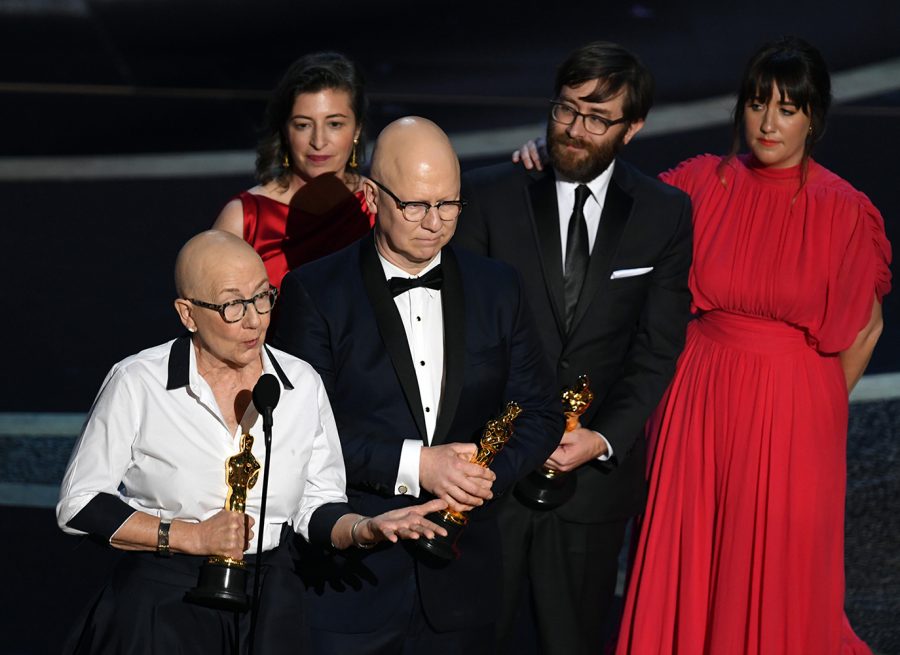Opinion: Keep politics out of the Oscars and appreciate the art
Political statements are suffocated when forced into 45-second speeches, especially from those who already wield so much cultural power.
Julia Reichert, left, Lindsay Utz, Steven Bognar, Jeff Reichert and Julie Parker Benello accept the Documentary – Feature – award for 'American Factory' onstage during the 92nd Annual Academy Awards at Dolby Theatre on February 09, 2020 in Hollywood, California.
February 11, 2020
Attendees at the 2020 Academy Awards spewed sanctimonious speeches nearly every time the chance allowed. Permit 45 seconds for speech, mix the wielding of a golden trophy, a splash of political jargon, add condescending expressions, and stir.
Comedian Steve Martin made the first political remark after reminding the audience of the Best Picture mishap two years prior. It struck close to home: “They have guaranteed this will not happen this year because the Academy has switched to the new Iowa caucus app.”
Many positions endorsed by the entertainment industry do their ideas a disservice. Changing minds requires a nuanced, long-format discussion — not 45 seconds full of quasi-imperatives.
Not every speech had these ingredients. After winning Best Actor, Joaquin Phoenix built bridges. “Sometimes we feel or are made to feel that we champion different causes, but for me I see commonality,” he said.
Political statements distract viewers from the ceremony’s aim: the appreciation of entertainment and storytelling.
By way of example, Natalie Portman donned a Dior gown combined with a cape displaying female directors who were “snubbed” from nomination. Considering her perfume could probably pay for a semester at the University of Iowa, I’m not really impressed.
A similar gripe can be made after American Factory co-director Julia Reichert spoke about unionization. “Working people have it harder and harder these days,” she said. “We believe that things will get better when workers of the world unite.”
Reichert’s statement is a paraphrased quote from The Communist Manifesto. I doubt anything truly revolutionary can be communicated in 45 seconds.
Fortunately, Best Director winner Bong Joon Ho, of the masterpiece Parasite, embodied the attitude every artist should wish to imitate.
“When I was in school, I studied Martin Scorsese’s films, just to be nominated is a huge honor,” Bong said. “I will drink until next morning.” His remarks were absent of politics and full of appreciation.
Perhaps Bong summoned his inner Walt Disney, considering these two are the only people to achieve four Oscars within the same ceremony. Bong may even have the upper hand considering Parasite was the first film to win an award which was not in English.
Discussing cinema is one of the few opinionated subjects where the nature of disagreement does not necessitate the loss or prevention of friendship. The additional political overlay to the Academy Awards undoes this observation.
Many entertainers endorse political candidates, such as comedian Dave Chappelle’s presidential endorsement of businessman Andrew Yang. Endorsing a campaign ought not to be forbidden in Hollywood. But attempting to condense important stances into their smallest available size is counterproductive.
Given in the past few years the vast amount of Oscar winners espouse political positions, new trophy winners are expected to do the same. This expectation forces politically uneducated orators to speak on the subject.
Political commentator Douglas Murray had a similar observation about unlearned political activists. “They breathed the ideas in, and are now merely breathing them out.”
Columns reflect the opinions of the authors and are not necessarily those of the Editorial Board, The Daily Iowan, or other organizations in which the author may be involved.





